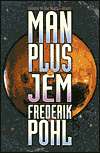|
|
Man PlusFrom Andrew Gordon, "Human, More or Less: Man-Machine Communion …" in The Mechanical God, edited by Thomas P. Dunn and Richard D. Erlich (Greenwood Press, 1982):
… [E]very "closed system" cyborg story has a more positive, "open system" counterpart, perhaps illustrating our fundamental ambivalence about the promise and threat of machines. For example, the motif of amputation and replacement by mechanical parts found in [Damon Knights's 1968 story] "Masks" is also used in Frederik Pohl's Man Plus (1976), but Pohl faces and transcends the fears of mutilation and mechanization. Examining the psychology of Man Plus, one could say that this novel overcomes castration anxiety, for the hero confronts the loss not only of his humanity but also his sexuality. The "Man Plus" is astronaut Roger Torraway, who volunteers to be transformed through massive surgery into a "monster," a cyborg who can survive on the surface of Mars. Like "Masks," Man Plus dwells at grim length on the pain, terror, and isolation of the transformation from human into cyborg. However, Pohl gives his hero a happy ending. In the conclusion, Torraway is not less than human … but more than human: man plus, man enhanced through machine implants. he adapts beautifully to Mars, saves the human race from war on Earth by helping to establish the first Mars colony, and, despite his castration, is even given a lover to replace the wife who has drifted away from him. As in the fable of the Ugly Duckling, a "monster" appears beautiful when placed in its appropriate physical or social environment.Man Plus perfectly illustrates the positive, speculative imagination of the "open-system" cyborg story: [in the words of Henry Kuttner,] "in a man-computer synthesis lies the hope of mankind's long-term survival and . . . the unfolding of his potential." In such stories, man-computer synthesis is not viewed as analogous to dehumanization but as a means to counter dehumanization. Pohl's novel creates a dialectical tension between the nightmare vision of cyborg as "monster" and the utopian vision of cyborg as "man plus," as the next stage of human evolution, thus acknowledging and yet transcending our fears about machine takeover. (195) Neil Baron for Encyclopedia Americana: Man Plus (1976), a Nebula winner, is a striking account of a man surgically altered for life on Mars. It asks how much we can give up and still call ourselves humans. Richard D. Erlich for this site: Roger Torraway may remain human, but Man Plus raises question of how much humanity generally is free from the evolved product of our own invention: machine consciousness. And the machines in turn ask, who or what might be manipulating them. |
